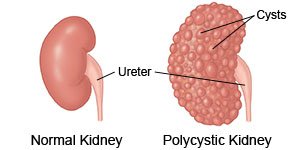Kidney Cyst
Medically reviewed by Drugs.com. Last updated on Aug 4, 2025.
What is a kidney cyst?
A kidney cyst is a fluid-filled sac that grows in your kidney. A simple cyst usually does not contain cancer. A complex cyst contains calcium deposits and needs to be checked over time for cancer. You may have one or more cysts. Both kidneys may form cysts at the same time.
 |
What increases my risk for a kidney cyst?
- Age older than 50 years
- Male gender
- A disease that affects how your kidneys work
- High blood pressure
- Smoking cigarettes
- Family history of a kidney cyst
What are the signs and symptoms of a kidney cyst?
Kidney cysts usually do not cause symptoms. A cyst that grows large may cause pain or discomfort in your side or abdomen. You may have blood in your urine or dark urine, or develop high blood pressure. Tenderness along with pain and a fever may be a sign of an infected cyst.
How are kidney cysts diagnosed?
Kidney cysts are usually found during tests for another reason. Once the cyst is found, you may need the following:
- An ultrasound, CT, or MRI may be used to take pictures of your kidneys and any cysts. You may be given contrast liquid to help your kidneys show up better in the pictures. Tell the healthcare provider if you have ever had an allergic reaction to contrast liquid. Do not enter the MRI room with any metal. Metal may cause serious injury. Tell the healthcare provider if you have any metal in or on your body.
- Blood tests may be used to check your kidney function.
How are kidney cysts treated?
Your cyst may need no treatment. Your healthcare provider may want you to have tests to check the size of the cyst over time. You may also need tests if you have hard deposits in the cyst. The deposits will be checked for cancer or other material that can cause health problems. Fluid may need to be drained from a cyst that becomes infected, bursts, or blocks blood or urine flow in the kidney. Surgery may be needed if the cyst is large.
What can I do to prevent or manage kidney cysts?
- Drink liquids as directed. Liquids help your kidneys work correctly. They can also help prevent a urinary tract infection. Ask your healthcare provider how much liquid to have each day and which liquids are best for you. Ask if you need to limit or not drink alcohol. Alcohol may damage your kidneys.
- Manage health conditions. Over time, conditions such as diabetes and high blood pressure that are not controlled may damage your kidneys.
- Do not smoke. Smoking may narrow blood vessels in your kidneys and raise your blood pressure. Smoking can also damage your kidneys. Ask your healthcare provider for information if you currently smoke and need help quitting. E-cigarettes or smokeless tobacco still contain nicotine. Talk to your healthcare provider before you use these products.
When should I seek immediate care?
- You have blood in your urine or your urine is dark.
- You have trouble urinating, or you are urinating more often than usual.
- You have a fever along with pain or tenderness below your ribcage and above your hip bones.
When should I contact my healthcare provider?
- You have questions or concerns about your condition or care.
Care Agreement
You have the right to help plan your care. Learn about your health condition and how it may be treated. Discuss treatment options with your healthcare providers to decide what care you want to receive. You always have the right to refuse treatment. The above information is an educational aid only. It is not intended as medical advice for individual conditions or treatments. Talk to your doctor, nurse or pharmacist before following any medical regimen to see if it is safe and effective for you.© Copyright Merative 2025 Information is for End User's use only and may not be sold, redistributed or otherwise used for commercial purposes.
Further information
Always consult your healthcare provider to ensure the information displayed on this page applies to your personal circumstances.
